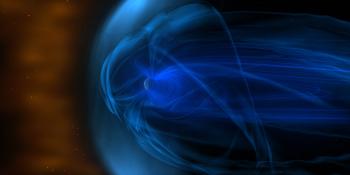Vaata laupäev, 27 aprill 2024 arhiivi
SIDC igapäevane bülletään päikese ja geomagnetilise aktiivsuse kohta
Välja antud: 2024 Apr 27 1250 UTC
SIDC ennustus
Päikesepursked ehk loited
M-class flares expected (probability >=50%)
Geomagnetism
Minor storm expected (A>=30 or K=5)
Päikese prootonid
Warning condition (activity levels expected to increase, but no numeric forecast given)
| 10 cm vool | Ap | |
|---|---|---|
| 27 Apr 2024 | 155 | 010 |
| 28 Apr 2024 | 153 | 023 |
| 29 Apr 2024 | 152 | 013 |
Päikese aktiivsed piirkonnad ja pursked
Solar flaring activity was at low levels over the past 24 hours with background C-class flaring. With several regions rotating behind the west limb there are currently 11 numbered active regions on the visible solar disc with NOAA AR 3654 (beta-gamma) near disc centre being the largest and most complex region. A new regions has fully rotated from the east limb, but remains silent. A few other small and simple regions in the easter hemisphere also remain quiet and unnumbered. The strongest activity was a C6.1 flare, peak time 20:22 UTC on April 26th, possibly produced by NOAA AR 3648 (previously beta-gamma) from the the west limb. The solar flaring activity is expected to be at low to moderate levels over the next days with possible isolated M-class flaring mainly from NOAA AR 3654 and less likely from NOAA AR 3648.
Krooniaine massiline väljavool
A large filament eruption was observed to lift off the south-east hemisphere around 18:00 UTC on April 26th with resulting slow coronal mass ejection (CME) and white light shock visible in the LASCO/C2 coronagraph imagery. Current analysis suggests no Earth-directed impact from this CME. No other Earth-directed CMEs have been observed in the available coronagraph imagery over the past 24 hours.
Krooniauk
A long negative polarity coronal hole stretching from high northern latitudes down to the equator is now touching the central meridian. The high speed stream emanating from it might arrive to Earth on May 1st.
Päikesetuul
Over the past 24 hours the solar wind parameters (ACE and DSCOVR) were indicative of a mixture of a glancing blow ICME arrival, possibly an early arrival of the April 24th CME, and an expected high speed stream (HSS) arrival from a positive polarity coronal hole. A tiny slow forward solar wind shock was observed around 00:00 UTC on April 27th. The solar wind velocity was in the range of 305 to 546 km/s. The interplanetary magnetic field (B) reached a maximum value of 16.8 nT with a minimum Bz of -11.6 nT. The B field phi angle switched orientation from negative to the positive sector (directed away from the Sun). The solar wind conditions are expected to remain elevated throughout April 27th and April 28th and possibly remain elevated throughout April 30th due to expected second HSS stream arrival from another positive polarity coronal hole. Further arrival of a HSS from a negative polarity coronal hole is possible on May 1st.
Geomagnetism
The geomagnetic conditions over the past 24 hours were at quiet to minor storm levels. Quiet to active conditions with possible new minor storm levels are anticipated for April 27th - April 29th.
Prootoni voo tasemed
Over the past 24 hours the greater than 10 MeV GOES proton flux was at background levels and is expected to remain so over the next days, pending any fast eruptive solar activity.
Elektronivoog geostatsionaarsel orbiidil
The greater than 2 MeV electron flux as measured by GOES 16 and GOES 18 was below the1000 pfu threshold over the past 24 hours. The greater than 2 MeV electron flux as measured by GOES 16 and GOES 18 is expected to remain below the 1000 pfu threshold in the next 24 hours. The 24h electron fluence was at nominal levels and is expected to remain so over the next 24 hours.
Tänane hinnanguline rahvusvaheline päikeselaikude arv (ISN): 147, põhineb 13 jaamadel.Päikese indeksid 26 Apr 2024
| Catania Wolfi number | /// |
| 10cm päikesevoog | 153 |
| AK Chambon La Forêt | 031 |
| AK Wingst | 023 |
| Hinnanguline Ap | 021 |
| Hinnanguline rahvusvaheline päikeselaikude arv | 135 - Põhineb 20 jaamal |
Märkimisväärsete sündmuste kokkuvõte
| Päev | Algus | Maks | Lõpp | Lokatsioon | Tugevus | OP | 10cm | Catania/NOAA | Raadiosignaalipursete tüübid | |
|---|---|---|---|---|---|---|---|---|---|---|
| Puuduvad | ||||||||||
Andmed on esitanud Päikeseinfektide Andmeanalüüsi Keskus (Solar Influences Data Analysis Center)© - SIDC - Töötleb SpaceWeatherLive
Kõik ajad UTC-s
<< Mine igapäevase ülevaate lehele
Viimane uudis
Viimane foorumi postitus
Toeta SpaceWeatherLive.com-i!
Paljud inimesed külastavad SpaceWeatherLive lehte selleks, et jälgida, mis toimub Päikesel või, kas on oodata virmalisi. Suurema liiklusega on serveri koormus ning maksumus kõrgem. Kui sulle meeldib see, mida me sinu heaks teeme, siis saad sa sellele ka ise natukene kaasa aidata, annetades selle lehe käigus hoidmise ja arendamise heaks. Ette tänades SpeaceWeatherLive meeskond!

Fakte kosmose ilmast
| Viimane X-loide | 28/03/2025 | X1.1 |
| Viimane M-loide | 21/04/2025 | M1.9 |
| Viimane geomagnetiline torm | 21/04/2025 | Kp5+ (G1) |
| Plekivabasid päevi | |
|---|---|
| Viimane päikese plekivaba päev | 08/06/2022 |
| Kuu keskmine päikeseplekkide arv | |
|---|---|
| märts 2025 | 134.2 -20.4 |
| aprill 2025 | 120 -14.2 |
| Viimased 30 päeva | 111.9 -31 |


